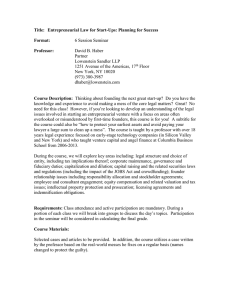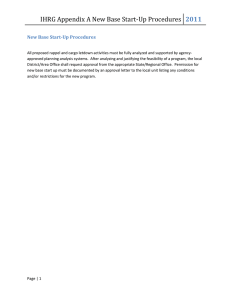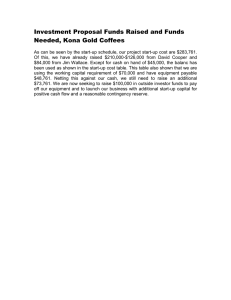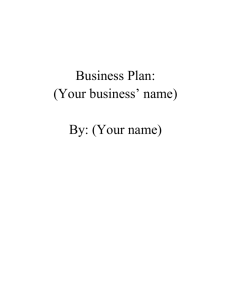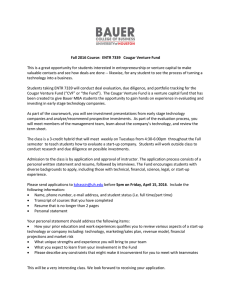Partner Lowenstein Sandler LLP 1251 Avenue of the Americas, 17
advertisement
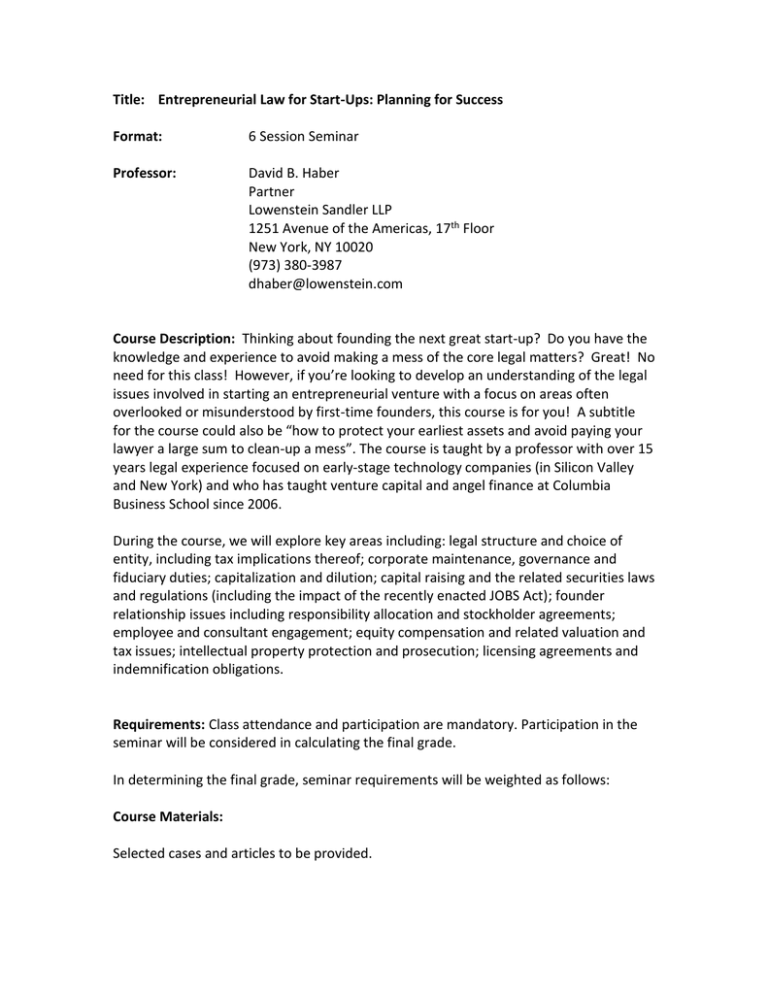
Title: Entrepreneurial Law for Start-Ups: Planning for Success Format: 6 Session Seminar Professor: David B. Haber Partner Lowenstein Sandler LLP 1251 Avenue of the Americas, 17th Floor New York, NY 10020 (973) 380-3987 dhaber@lowenstein.com Course Description: Thinking about founding the next great start-up? Do you have the knowledge and experience to avoid making a mess of the core legal matters? Great! No need for this class! However, if you’re looking to develop an understanding of the legal issues involved in starting an entrepreneurial venture with a focus on areas often overlooked or misunderstood by first-time founders, this course is for you! A subtitle for the course could also be “how to protect your earliest assets and avoid paying your lawyer a large sum to clean-up a mess”. The course is taught by a professor with over 15 years legal experience focused on early-stage technology companies (in Silicon Valley and New York) and who has taught venture capital and angel finance at Columbia Business School since 2006. During the course, we will explore key areas including: legal structure and choice of entity, including tax implications thereof; corporate maintenance, governance and fiduciary duties; capitalization and dilution; capital raising and the related securities laws and regulations (including the impact of the recently enacted JOBS Act); founder relationship issues including responsibility allocation and stockholder agreements; employee and consultant engagement; equity compensation and related valuation and tax issues; intellectual property protection and prosecution; licensing agreements and indemnification obligations. Requirements: Class attendance and participation are mandatory. Participation in the seminar will be considered in calculating the final grade. In determining the final grade, seminar requirements will be weighted as follows: Course Materials: Selected cases and articles to be provided. Schedule of Seminar Topics: Week 1: Course overview and introduction to choice of legal entity and related tax matters and capitalization calculations and considerations. On this day, we’ll focus on what factors to consider when choosing your form of legal entity, the implications for changing your mind and how to properly allocate and keep track of one of your most precious assets—the equity. We’ll limit the math to some basic algebra. Week 2: We’ll continue our discussion of capitalization and introduce equity compensation—a key component of a start-up’s pay package. The professor will do his best to bring excitement to the Internal Revenue Code as we explore some key tax areas that significantly impact the company and its service providers in the start-up phase. Week 3: It is often said that a start-up company’s main assets walk in and out the door each day. On this day we’ll cover the basics of hiring and terminating employees and consultants, the determination of who fits into which category and why it matters (there’s that tax issue again!). We’ll also explore some best practices for employment policies and what to say and what not to say in written employment documents including restrictive covenants such as non-competition and non-solicitation agreements. Week 4: If a start-up’s main assets are its people, then what their minds produce must be captured and synthesized into the company’s secret sauce. On this day we’ll complete our discussion “human capital” by transitioning to a discussion of intellectual property including an overview of patents, trademarks copyrights and trade secrets. We’ll explore how intellectual property must be protected both internally and externally and how it may be used in the competitive landscape as both a “shield and a sword”. Lastly, we’ll discuss key issues related to the monetization and licensing of intellectual property and certain key obligations and potential liabilities often encountered at the start-up phase. Week 5: At this point, we’ll have discussed securing the assets--team and IP--in a legal entity that fits the company’s goals. Now, we’ll focus on initial capital raising from angel investors and venture capitalists through both equity and convertible debt structures. We’ll discuss the securities laws implicated by raising capital in the private markets including the impact of the JOBS Act. Time will be spent discussing the key attributes that angels and VC’s require to finance ventures with an eye towards learning to speak their language. Week 6: The course will end with the exploration of market terms and conditions for venture and angel rounds. We’ll also spend time working on term sheets and liquidation models to understand how the variables impact the potential return. 2
